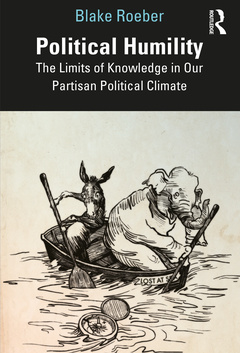Description
Political Humility
The Limits of Knowledge in Our Partisan Political Climate
Author: Roeber Blake
Language: English
Subjects for Political Humility:
Publication date: 04-2024
· 15.2x22.9 cm · Paperback
Publication date: 04-2024
· 15.2x22.9 cm · Hardback
Description
/li>Contents
/li>Readership
/li>Biography
/li>
This book aims to change the way we think about politics, talk about politics, and vote.
It does this in two ways. First, it shows it?s impossible for a Republican, Democrat, or voter in any political party to possess a significant level of knowledge of facts that would help their party secure or maintain political power. It calls this knowledge ?political knowledge? and shows how unfeasible it is for anyone to have it. Second, it explains how we might best be politically engaged, given that we have virtually no political knowledge.
To argue that it is impossible for any person to possess a significant amount of political knowledge, the book depends on two empirically verified facts. The first is that we have virtually no means of acquiring political information except by believing what other people say. The second is that, when people start talking about politics, they become highly unreliable. They?re very likely to say false things when voicing political opinions because they employ a belief?forming process that psychologists call ?identity protective cognition.? This is a type of reasoning aimed, not at truth, but at preserving one?s membership in some identity?defining group. In combination, these two observations cast serious doubt on all of our political beliefs.
As the book explains, however, the proper response to this doubt is not to simply avoid politics. Rather the best response is a kind of humble but real engagement with politics that constantly manifests one?s awareness that one is, at best, making educated guesses rather than speaking and acting from knowledge.
Part 1. 1. Guns and Words; 2. The Testimonial Foundations of Our Political Convictions; 3. The Unreliability of Political Testimony; 4. Hopeful Political Skepticism; 5. Political Humility; Part 2. 6. Testimonial Feedback Loops; 7. Political Beliefs in Contemporary Epistemological Perspective
Blake Roeber is the Thomas J. and Robert T. Rolfs Associate Professor of Philosophy at the University of Notre Dame.




